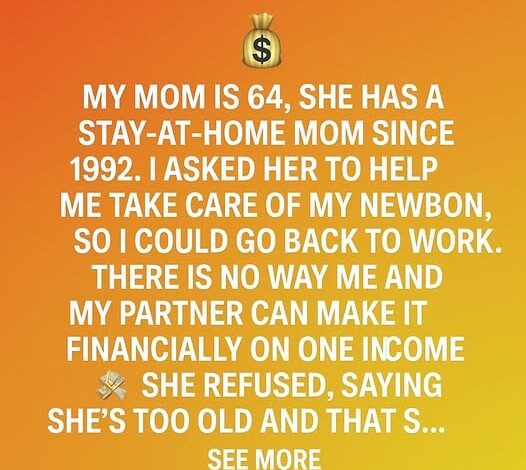
Grandma Stands Her Ground, When a Mothers Free Babysitter Plan Backfired
Parenthood is one of the most rewarding journeys a person can embark on, but it is also exhausting, demanding, and often financially straining. Many new parents hope for an extra set of helping hands, usually from their own parents or in-laws, who they assume will be eager to step into the role of doting grandparents. Yet, as one viral story proved, those expectations don’t always align with reality.
The story unfolded on Reddit when a woman, recently returning to work after giving birth, reached out to her 64-year-old mother with what she thought was a reasonable request: to care for her newborn during work hours. Her mother, who had been a stay-at-home mom since the early 1990s, surprised everyone by saying no.
The grandmother explained that she had already raised her children and now wanted to enjoy her retirement years without the burden of full-time childcare. She gently suggested her daughter and son-in-law consider a more “traditional” household model—one where one parent stays home to raise the child. But there was a catch. The daughter was the higher earner in the family, making her career essential for their financial stability. Quitting her job was simply not an option.
The situation took an unexpected turn when the grandmother added a condition. She was willing to babysit—but only on her own terms. She set her rate at $20 an hour, with extra charges if her daughter and son-in-law were late. On top of that, she required the couple to provide duplicate supplies of everything the baby needed: diapers, wipes, formula, bottles, clothing, and toys. That way, she wouldn’t have to transport items back and forth.
Her daughter, initially stunned, began to weigh her options. Daycare, while expensive and not her first choice, was suddenly on the table. The request sparked a heated debate online, with thousands of people chiming in. Some sided with the daughter, arguing that family should support one another without attaching a price tag. Others firmly defended the grandmother, insisting that her retirement years were hers to enjoy, not to be consumed by the all-encompassing demands of infant care.
The controversy revealed a deeper, more universal conflict: the clash between modern parenting expectations and generational perspectives. For many young parents, rising childcare costs make leaning on grandparents seem like the natural solution. Yet for older generations who already devoted decades to raising their own families, the idea of stepping back into a caregiver role feels like forfeiting their long-awaited freedom.
Commenters online pointed out that taking care of a newborn is not the same as casual babysitting. It’s a full-time responsibility involving sleepless nights, constant feeding schedules, and endless laundry. At 64, the grandmother may no longer have the physical stamina for such tasks. Others noted that by offering her services at an hourly rate, she was setting healthy boundaries and valuing her own time, something that is often overlooked when it comes to women’s unpaid labor.
Supporters of the daughter countered that the grandmother’s refusal felt cold and transactional. They argued that grandparents traditionally help with grandchildren not just out of obligation but out of love, and that charging her daughter might damage their relationship. “She’s not a stranger off the street,” one commenter wrote. “This is her grandchild.”
But others flipped the argument. “Exactly,” another user replied. “It’s her grandchild, not her responsibility. Love doesn’t mean sacrificing your independence or health. Parents need to parent.”
The discussion quickly expanded beyond one family’s disagreement, touching on broader societal issues. Many highlighted how expensive childcare has become in most countries, with some parents spending more on daycare than they would on college tuition. The grandmother’s refusal, they said, wasn’t just about family boundaries—it was a reflection of how little structural support exists for working parents.
In the end, the story struck a chord because it challenged assumptions. Too often, people assume grandparents will happily step into childcare roles without considering that they may have different priorities for their later years. Retirement, after all, is meant to be a time of rest, hobbies, and self-fulfillment—not necessarily a second round of full-time parenting.
As for the daughter, she admitted she was disappointed but also realized she would need to explore alternatives. Whether through daycare, a nanny, or adjusted work schedules, she and her partner would have to find a solution without relying on free labor from her mom.
What this viral story ultimately exposed is the delicate balance between family obligation and personal freedom. It forced people to confront uncomfortable but necessary questions: How much should we expect from our parents once we become parents ourselves? Where is the line between love-driven support and unfair expectation? And how can society better support working families so these conflicts don’t tear households apart?
One Redditor perhaps summed it up best: “Parents raise their kids. Grandparents raise their kids. But nobody should expect someone else to raise their kids for them. Anything extra is a blessing, not a right.”
The grandmother’s firm stance might have sparked controversy, but it also made one thing clear: boundaries, even in families, matter. Her daughter may not have received the answer she wanted, but she did receive an important lesson—that support can come in many forms, but at the end of the day, the responsibility of parenting lies with the parents themselves.




